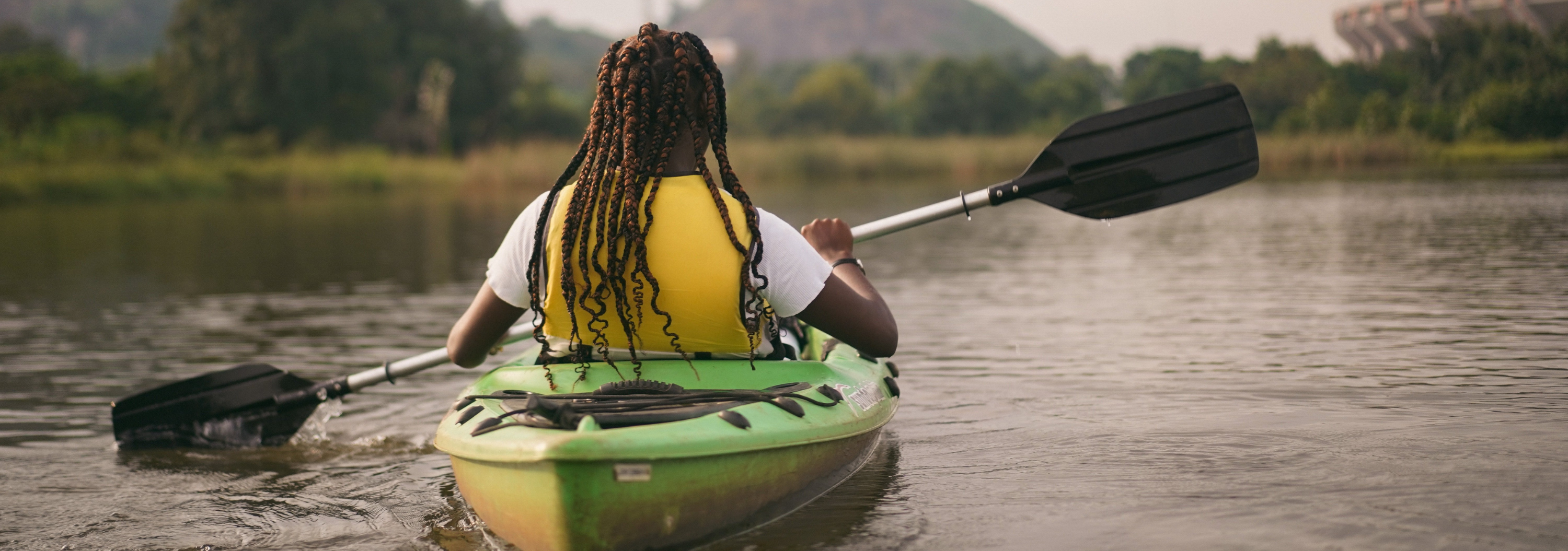We Don’t Do Outdoor Education for Fun
“Absolutely not,” Lana* said defiantly, glaring at the water and crossing her arms over her chest. “I’m not kayaking.”
From the moment she learned her class would be kayaking, Lana, a high school student at one of Positive Education Program’s Day Treatment Centers, had been very vocal about her fear of water and certainty of non-participation. Her teacher had even contacted PEP’s outdoor education manager, Doug Hershman, to warn him that Lana would not be getting on the water. “She is adamant,” the teacher explained.
Hershman runs into this type of scenario regularly with students in his work, whether it’s hiking, kayaking, rock climbing or any other activity that the kids haven’t tried before. “I ask them all the time, ‘who can make you do something you don’t want to do?’” he says. “They all know the answer: No one. I don’t ever make a kid do something that they don’t want to do.”
A Change of Heart
Nonetheless, when Lana’s teacher warned Hershman about her reluctance, he had a feeling she might soften as the day went on. Pretty much everything he does with the kids is about overcoming some type of challenge – crawling through a cave, getting to the next grip on a rock wall, or stepping into a boat for the first time. He can’t even count the number of times he has witnessed a kid in his program go from a resigned, “I can’t do that,” to an exuberant “I can’t believe I did that!”
So, when Lana stood on the shore glaring at the water, Hershman told her she didn’t have to go. He suggested they just do some things on land that would mimic being in a boat. The classroom lined their kayaks up near the shore and sat in them on the ground. They moved from side to side to see what it felt like. They practiced the motion of paddling.
Finally, slowly, and with Hershman up to his knees in the water holding their kayaks still, the class got in their boats one at a time and paddled into the water. Except for Lana. She was pacing nervously along the shore and chewing on a fingernail.
“I’ll try it,” she announced suddenly. “Will you hold my kayak Mr. Hershman?” With that – and with careful reassurances about the minimal depth of the water – Lana cautiously got into her kayak.
“We don’t do outdoor education for fun,” explains Hershman. “We do it for the therapeutic benefit and growth it has for our kids. It just also happens to also be fun most of the time.” Most outdoor activities can be carried out in a therapeutic way. For kids who struggle with anxiety, complex trauma or who have developmental delays, that may mean breaking the steps down a bit more. In Lana’s case, that is why Hershman started the lesson with the class’s kayaks on the ground.
Kayaking and the Neurosequential Model of Therapuetics™
One of the reasons Hershman chooses kayaking as one of PEP’s outdoor education activities is because of its biologically-based therapeutic benefit in line with the Neurosequential Model of Therapeutics™ (NMT). PEP is a Phase II Certified NMT site through the Neurosequential Network and regularly incorporates its tenets into programming, from the classroom to kayaking.
“Kayaking is the perfect activity to activate the benefits of NMT,” says Hershman. “There’s the bilateral, cross-body stimulation of the brain from paddling. It’s rhythmic and calming. And even though you are alone in your boat, kayak culture is like a family, so it’s relational.”
The NMT effects were evident with Lana. Not only did she do a great job on the water, she had a really good day. Lana, who was having a rocky start to her school year, struggles to regulate her emotions and had been getting in trouble a lot. On the water, though, something happened. She felt successful and it translated to the rest of her day. When the group stopped for lunch Lana was calm and acted as a leader and a role model. “She realized she had that potential when she was out on the lake, and it carried through to her day. It was one of the best days she has had so far at school this year,” said Hershman.
Learn More
To learn more about PEP’s outdoor education program or Day Treatment Centers, visit our website. Contact Nicole Molnar, sr. director, clinical services, at 216-361-7760 ext. 110 or via email to see if a student in your district may be a good fit.
Please note, referrals to PEP’s Day Treatment Centers are made through school districts. Interested parents or caregivers should contact their school administrator.
*Not her real name. This story is based on a real experience but minor details may be altered.
